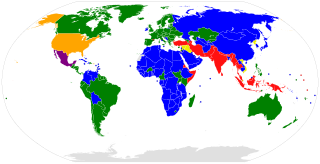
The Convention relative to the Protection of Civilian Persons in Time of War, more commonly referred to as the Fourth Geneva Convention and abbreviated as GCIV, is one of the four treaties of the Geneva Conventions. It was adopted in August 1949, and came into force in October 1950. While the first three conventions dealt with combatants, the Fourth Geneva Convention was the first to deal with humanitarian protections for civilians in a war zone. There are currently 196 countries party to the 1949 Geneva Conventions, including this and the other three treaties.
A civilian is a person who is not a member of an armed force nor a person engaged in hostilities.

A private military company (PMC) or private military and security company (PMSC) is a private company providing armed combat or security services for financial gain. PMCs refer to their personnel as "security contractors" or "private military contractors".

A letter of credit (LC), also known as a documentary credit or bankers commercial credit, or letter of undertaking (LoU), is a payment mechanism used in international trade to provide an economic guarantee from a creditworthy bank to an exporter of goods. Letters of credit are used extensively in the financing of international trade, when the reliability of contracting parties cannot be readily and easily determined. Its economic effect is to introduce a bank as an underwriter that assumes the counterparty risk of the buyer paying the seller for goods.

Protocol I is a 1977 amendment protocol to the Geneva Conventions concerning the protection of civilian victims of international war, including "armed conflicts in which peoples are fighting against colonial domination, alien occupation or racist regimes". In practice, Additional Protocol I updated and reaffirmed the international laws of war stipulated in the Geneva Conventions of 1949 to accommodate developments of warfare since the Second World War (1937–1945).

The Hague Convention for the Protection of Cultural Property in the Event of Armed Conflict is the first international treaty that focuses exclusively on the protection of cultural property in armed conflict. It was signed at The Hague, Netherlands, on 14 May 1954 and entered into force on 7 August 1956. As of July 2021, it has been ratified by 133 states.
Confidence-building measures (CBMs) or confidence- and security-building measures (CSBMs) are actions taken to reduce fear of attack by both parties in a situation of conflict. The term is most often used in the context of armed conflict, but is similar in logic to that of trust and interpersonal communication used to reduce conflictual situations among human individuals.

In Turkey, compulsory military service applies to all male citizens from 21 to 41 years of age. It is 6 months for all males regardless of education degree. Different rules apply to Turks abroad. For Turks with multiple citizenship, the conscription lapses if they have already served in the army of another country.

The African Standby Force (ASF) is an international, continental African, and multidisciplinary peacekeeping force with military, police and civilian contingents that acts under the direction of the African Union. The ASF is to be deployed in times of crisis in Africa. Addis Ababa, Ethiopia, serves as the Force's Headquarters. Douala, Cameroon, was selected in 2011 as the site of the AU's Continental Logistics Base (LOGBASE).

War can heavily damage the environment, and warring countries often place operational requirements ahead of environmental concerns for the duration of the war. Some international law is designed to limit this environmental harm.

United Nations Security Council Resolution 1674, adopted unanimously on April 28, 2006, after reaffirming resolutions 1265 (1999) and 1296 (2000) concerning the protection of civilians in armed conflict and Resolution 1631 (2005) on co-operation between the United Nations and regional organisations, the Council stressed a comprehensive approach to the prevention of armed conflict and its recurrence.
The United Nations Mercenary Convention, officially the International Convention against the Recruitment, Use, Financing and Training of Mercenaries, is a 2001 United Nations treaty that prohibits the recruitment, training, use, and financing of mercenaries. At the 72nd plenary meeting on 4 December 1989, the United Nations General Assembly concluded the convention as its resolution 44/34. The convention entered into force on 20 October 2001 and has been ratified by 46 states.
Offsets are compensatory trade agreements, reciprocal trade agreements, between an exporting foreign company, or possibly a government acting as intermediary, and an importing entity. Offset agreements often involve trade in military goods and services and are alternatively called: industrial compensations, industrial cooperation, offsets, industrial and regional benefits, balances, juste retour or equilibrium, to define mechanisms more complex than counter-trade. Counter-trade can also be considered one of the many forms of defense offset, to compensate a purchasing country. The incentive for the exporter results from the conditioning of the core transaction to the acceptance of the offset obligation.

The Geneva Conventions are international humanitarian laws consisting of four treaties and three additional protocols that establish international legal standards for humanitarian treatment in war. The singular term Geneva Convention colloquially denotes the agreements of 1949, negotiated in the aftermath of the Second World War (1939–1945), which updated the terms of the two 1929 treaties and added two new conventions. The Geneva Conventions extensively define the basic rights of wartime prisoners, civilians and military personnel; establish protections for the wounded and sick; and provide protections for the civilians in and around a war-zone.
The military doctrine of Russia is a strategic planning document of the Russian Federation, representing a system of official state-adopted views on preparation and usage of the Russian Armed Forces. The most recent revision of the military doctrine was approved in 2014.
A law enforcement agency (LEA) is any government agency responsible for law enforcement within a specific jurisdiction through the employment and deployment of law enforcement officers and their resources. The most common type of law enforcement agency is the police, but various other forms exist as well, including agencies that focus on specific legal violation, or are organized and overseen by certain authorities. They typically have various powers and legal rights to allow them to perform their duties, such as the power of arrest and the use of force.
The International Code of Conduct for Private Security Service Providers is a set of principles for private military and security providers, created through a multi-stakeholder initiative convened by the Swiss government. This process involved and continuously involves representatives from private security companies, states, and civil society organizations. The code reinforces and articulates the obligations of private security providers particularly with regard to international humanitarian law and human rights law. The Code also sets the foundation for developing an institutional framework to provide oversight of and accountability to the Code. Accordingly, the stakeholders involved agreed on ‘Articles of Association’ setting up an oversight mechanism, the International Code of Conduct Association (ICoCA).

The Afghan Public Protection Force (APPF) was a Government of the Islamic Republic of Afghanistan (GIRoA) security service provider intended to protect people, infrastructure, facilities and construction projects. The APPF is organized as a State Owned Enterprise (SOE) subordinate to the Ministry of the Interior (MOI) and designed to contract with both domestic and international customers for security services within Afghanistan. Between 20 March 2012 and 20 March 2013, the APPF will replace all non-diplomatic Private Security Companies (PSCs) in Afghanistan as the sole provider of pay-for-service security requirements. APPF guards have no mandate to investigate crimes or arrest suspects.

This article outlines the present structure of the European Union's Common Security and Defence Policy (CSDP), a part of the Common Foreign and Security Policy (CFSP) based on articles 42–46 of the Treaty on European Union (TEU). Article 42.2 of TEU states that the CSDP includes the 'progressive framing' of a common Union defence policy, and will lead to a common defence, when the European Council of national heads of state or government, acting unanimously, so decides.
A Private Maritime Security Company (PMSC) is a form of Private Military Company that offers services in the maritime sector.












